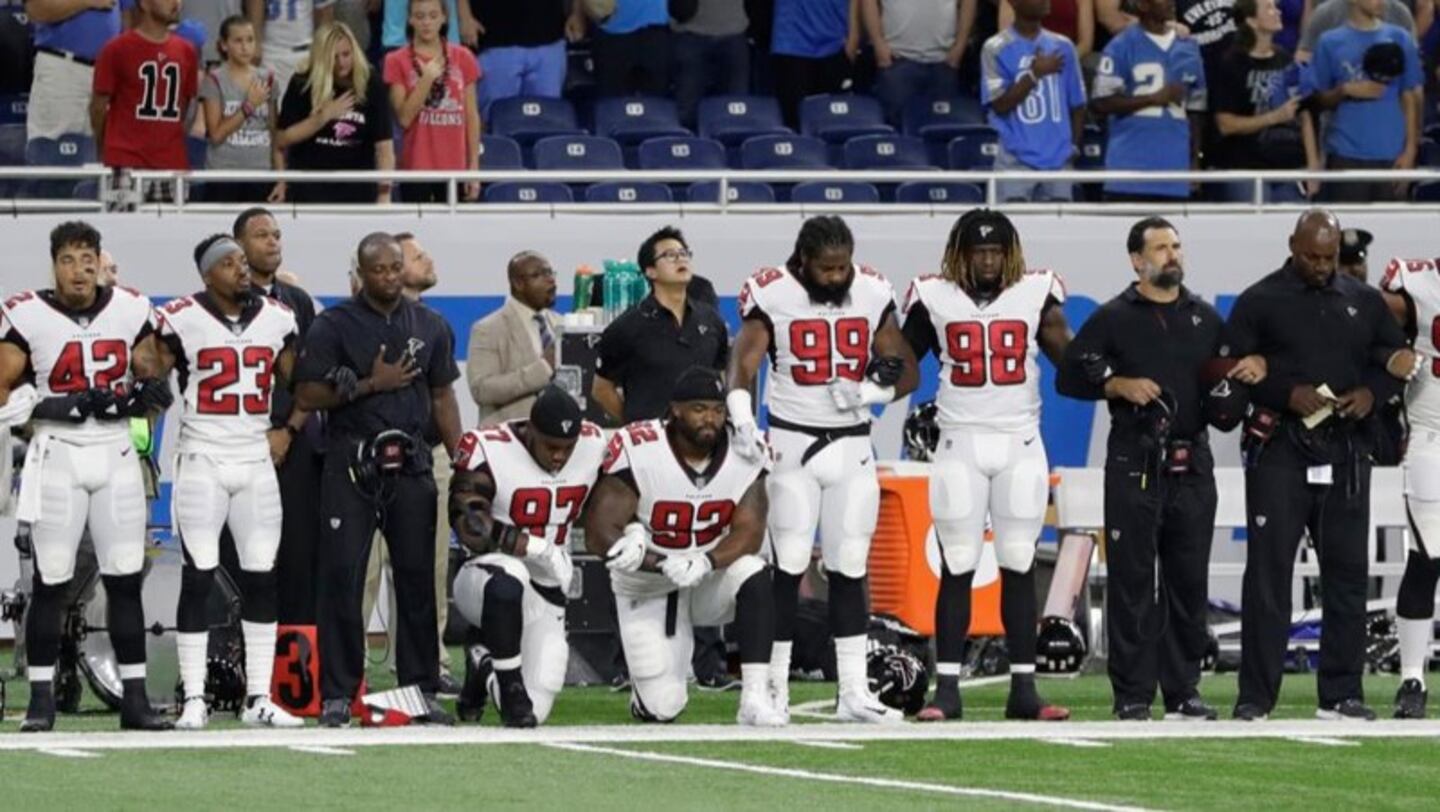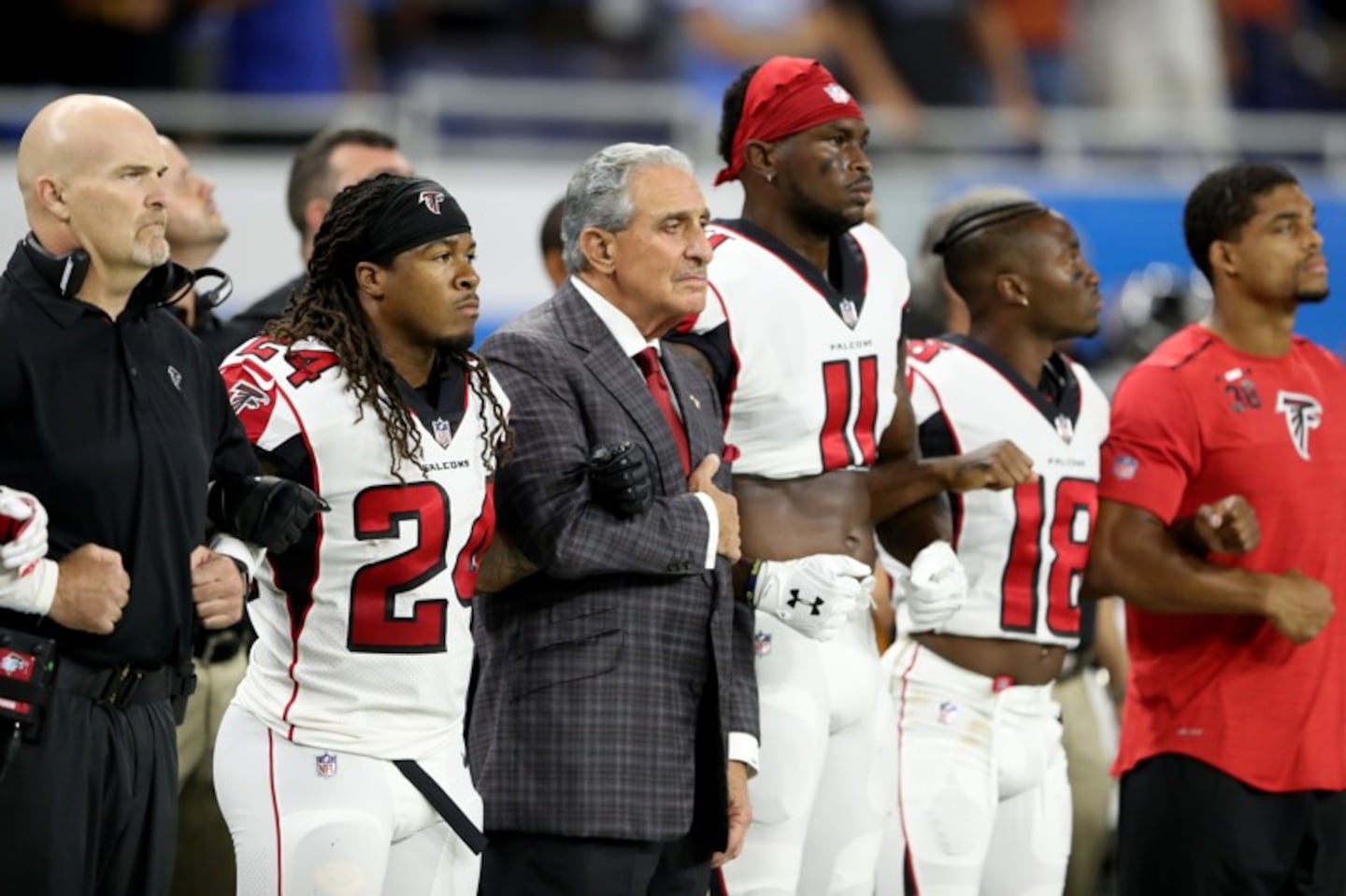DETROIT — For Grady Jarrett and Dontari Poe, it was a simple decision to kneel during the national anthem Sunday after President Donald Trump referred to any NFL player who has protested racial and social injustice by taking a knee as a “son of bitch.”
“I felt like me, myself, Grady Jarrett is the son of a Queen and that’s my message,” Jarrett said after the game.
He had been thinking about protesting for a while, but the comments by Trump pushed him to do more.
“My spirit moved me in a way and it was on my mind,” Jarrett said. “It was on my mind man, and ... it is so awesome because having the support of your brothers and support of an organization like this, this has been, this is truly a blessing. It’s truly a blessing. And I’m just thankful.”
Poe knelt to make a statement against racial and social injustice in the country and said he intended no disrespect to the flag or the military.
“I know people (in the military),” Poe said. “I have girl friend who’s in the Air Force. She’s in the reserves now. I’m not disrespecting that at all. I wouldn’t disrespect her like that. At the same time, I felt it wasn’t disrespecting the flag, but I was just standing up for what I believe in.”
Poe said he was moved by teammate’s Adrian Clayborn’s speech about the diversity on the team and how he wished the country was like the Falcons’ locker room. The team often refers to itself as “The Brotherhood.”
“He put it in such great words,” Poe said. “It was something that I paid close attention to. It was all truth in it. Basically, he wishes the outside world was like our locker room, with people of all different colors and creeds ... we’re fighting together. We are a Brotherhood.
“We don’t look at nothing else but that. He said he wished the world was like that and that it would be much better place. I totally agree with him.”
Clayborn was the only player on the team to respond to the tweets from President Trump. He spoke to the issues of privilege in the nation.
“It so diverse in football,” Clayborn said. “We come from everywhere and it’s a shame we can’t all get along. I wish we could be like that, but it probably will never be. If it was, it would be a way better place.”
RELATED STORIES:
- Falcons, Lions link arms during national anthem
- Owners of NASCAR threaten to fire those who protest during national anthem
- NFL commissioner, players' union angrily denounce Trump
Teams across the league protested President Trump and labeled his tweets “divisive” to the fabric of the country. Falcons owner Arthur Blank and Lions owner Martha Ford, who is 92 years old, both stood on the sidelines with their teams.
“I’m not going to lie,” Clayborn said. “It was hard pre-game, just trying to focus on the actual game. But once it started I was locked in. Thank God I got my brain locked in. When you get so much hate and so many people hate your guts because of something you believe in, it’s crazy. But we locked in. We got it done.”
Clayborn, who is from St. Louis where they’ve had two police officers acquitted in high-profile shooting cases of African-Americans, has become the socially conscious member of the team.
“It was a team meeting,” Clayborn said. “It’s our brotherhood coming together. People are saying nasty things about us and we have to stick together. It’s coming in hot.”
Falcons coach Dan Quinn stood during the national anthem and supported having Blank on the field with the team.
“I’d like to recognize Arthur being down on the field with the team prior to the game and showing his solidarity for not just the Falcons, but for the NFL in general,” Quinn said. “He continues to demonstrate what a class act he is to all of the players and staff and coaches. We really appreciate him.”
Blank was fine with players’ decisions.
”What they do is their choice,” Blank said. “I’m supportive of our players. I’m certainly supportive of their rights to express their freedom of speech. I don’t think…the people that fought for this country going back several hundred years primarily weren’t fighting for geography. They were fighting for way of life, and part of that is reflected in the freedom of speech and the ability to speak up and speak out on issues.”
Cox Media Group






